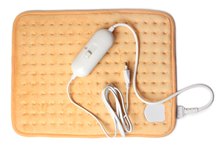The Side Effects of Taking Hyaluronic Acid Supplements
Hyaluronic acid is a type of medication used to treat osteoarthritis pain in patients who are already taking pain relievers such as acetaminophen. Hyaluronic acid is similar to the synovial fluid in your joints that your body uses to lubricate your joints and absorb shock. In order to lower your risk of possible adverse effects and reactions, you should consult your doctor before you consider getting hyaluronic acid injections.
Adverse Skin Reactions
Although not considered a common side effect, hyaluronic acid has caused skin to blister or appear discolored. The skin around the injection site may become swollen and sore after hyaluronic acid has been administered. The skin near the injection site may also become itchy, or may feel cold or like it’s burning. If you are allergic to hyaluronic acid, rashes may also appear all over the rest of your body.
- Although not considered a common side effect, hyaluronic acid has caused skin to blister or appear discolored.
- The skin around the injection site may become swollen and sore after hyaluronic acid has been administered.
Muscle Pain and Difficulty Moving
Why Are Muscles Around My Knee Tight & Sore?
Learn More
Hyaluronic acid causes muscle pain or cramping after being administered, explains the University of Maryland Medical Center. Your legs may feel tingly or numb as a result of hyaluronic acid use. You will experience some degree of discomfort or pain in the knee that was injected with hyaluronic acid. Your arms and legs may also become swollen, making movement difficult. The joint pain of the affected area is supposed to be temporary, so you should consult your doctor if the pain persists.
- Hyaluronic acid causes muscle pain or cramping after being administered, explains the University of Maryland Medical Center.
- You will experience some degree of discomfort or pain in the knee that was injected with hyaluronic acid.
Severe Allergy and Other Adverse Reactions
If you are allergic to hyaluronic acid, your face and throat areas will become swollen after exposure to hyaluronic acid. Severe allergic reactions will cause your throat to close, impairing breathing, says Drugs.com. Elevated heart rate and chest pain are also possible adverse reactions. Headaches, dizziness or sleepiness are also possible reactions to hyaluronic acid use.
- If you are allergic to hyaluronic acid, your face and throat areas will become swollen after exposure to hyaluronic acid.
Considerations
Hyperextension of the Calf
Learn More
The medication is administered via injection into your knee joint, according to the University of Maryland Medical Center. You should avoid physical activities that put strain on your knees such as jogging, running, heavy lifting and prolonged standing after receiving your hyaluronic acid injection. You may resume such activities after about two days unless otherwise specified by your doctor, warns Drugs.com. The usual adult dose is about 2 mL into the knee once a week for up to a month. Although it is currently not known whether hyaluronic acid interacts adversely with other medications, you should nevertheless inform your doctor before taking any medications while you are getting hyaluronic acid injections.
- The medication is administered via injection into your knee joint, according to the University of Maryland Medical Center.
- Although it is currently not known whether hyaluronic acid interacts adversely with other medications, you should nevertheless inform your doctor before taking any medications while you are getting hyaluronic acid injections.
Related Articles
References
- Drugs.com; Hyaluronan; June 2011
- American Society of Plastic Surgeons: Dermal Fillers: Hyaluronic Acid
- University of Maryland Medical Center; Hylan G-F 20 (Injection); January 2010
- Simone, P., Alberto, M. Caution Should be Used in Long-Term Treatment with Oral Compounds of Hyaluronic Acid in Patients with a History of Cancer. Clin Drug Investig 35, 689–692 (2015). https://doi.org/10.1007/s40261-015-0339-x
- Arthritis Foundation. Hyaluronic acid injections for osteoarthritis pain.
- Richette P, Chevalier X, Ea HK, et al. Hyaluronan for knee osteoarthritis: an updated meta-analysis of trials with low risk of bias. RMD Open. 2015;1(1):e000071. doi:10.1136/rmdopen-2015-000071
- Nelson FR, Zvirbulis RA, Zonca B, et al. The effects of an oral preparation containing hyaluronic acid (Oralvisc®) on obese knee osteoarthritis patients determined by pain, function, bradykinin, leptin, inflammatory cytokines, and heavy water analyses. Rheumatol Int. 2015 Jan;35(1):43-52. doi:10.1007/s00296-014-3047-6
- Jensen GS, Attridge VL, Lenninger MR, Benson KF. Oral intake of a liquid high-molecular-weight hyaluronan associated with relief of chronic pain and reduced use of pain medication: results of a randomized, placebo-controlled double-blind pilot study. J Med Food. 2015 Jan;18(1):95-101. doi:10.1089/jmf.2013.017
- Oe M, Sakai S, Yoshida H, et al. Oral hyaluronan relieves wrinkles: a double-blinded, placebo-controlled study over a 12-week period. Clin Cosmet Investig Dermatol. 2017;10:267-273. doi:10.2147/CCID.S141845
- Göllner I, Voss W, Von hehn U, Kammerer S. Ingestion of an oral hyaluronan solution improves skin hydration, wrinkle reduction, elasticity, and skin roughness: results of a clinical study. J Evid Based Complementary Altern Med. 2017;22(4):816-823. doi:10.1177/2156587217743640
- Oe M, Tashiro T, Yoshida H, et al. Oral hyaluronan relieves knee pain: a review. Nutr J. 2016;15:11. doi:10.1186/s12937-016-0128-2
- RxList. Synvisc. Updated 6/26/17.
- Simone, P., Alberto, M. Caution Should be Used in Long-Term Treatment with Oral Compounds of Hyaluronic Acid in Patients with a History of Cancer. Clin Drug Investig 35, 689–692 (2015).
Writer Bio
Joseph Pritchard graduated from Our Lady of Fatima Medical School with a medical degree. He has spent almost a decade studying humanity. Dr. Pritchard writes as a San Francisco biology expert for a prominent website and thoroughly enjoys sharing the knowledge he has accumulated.







